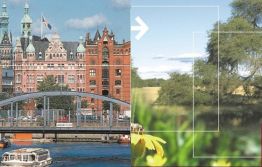Project Aim
The main aim of the URBAL project was to develop more balanced rural and urban areas by influencing regional planning toward a less fragmented rural and urban approach. As part of this process URBAL intended to create win-win situations for both urban and rural areas and carry out strategies for implementation throughout the North Sea Region (NSR).
Project implementation and results
Spatial development
The URBAL project motto "let's bring urban and rural together" revealed the main project challenge which have been achieved when building bridges between urban and rural interests and developing strategies for cooperation between urban and local actors.
Pilot projects
The project has given rise to demonstration projects for both urban and rural actors. As one example, North Yorkshire County Council (UK) has taken over the signage of cycling routes (numbering). In the next stage it is envisaged to produce a cycle route map based on numbers, taking into account the resting places and farms offering local produce and B&Bs.
In the Netherlands a pilot project “Youth care farms” have been carried out. Therefore a special programme has started for child care on more than 20 farms, reducing the waiting list in the cities. Special attention was given to possibilities for children with autism. A three days training programme has been developed and implemented about "orientation on care farms from children; possibilities and limitations".
Joint transnational strategy
Mode of cooperation
In most projects the current institutional setting was considered an obstacle for cross-sectoral integration. Fragmented governance was shown clearly through the participative approach of the projects: citizens do not think or act in sectoral policies. This urged the municipality to better organise inter-sectoral coordination.
The project partners made a short research on the issue of stakeholder management in different URBAL situations in the regional area of Deventer (NL). The main outcome was involve inhabitants and representatives of the interested organisations if you are really interested in collective problem solving.
Impact of the project
Long-term achievements
A large number of the regional URBAL projects were practical demonstrations of new practices in regional planning and local development. The project carried out new instruments of spatial planning such as quality systems and monitoring tools. Pilot projects introduced new services of social policy, for example a volunteer centre for health care or came up with new tools of economy policy such as commercial and cultural events to promote local food products. In addition, a new network of cooperation including a platform of landscape management was formed.
The URBAL project has led to new ideas, partnerships and initiatives beyond the initial expectations at the beginning of the project. A number of the actions undertaken boosted regional cooperation, sometimes in situations where such cooperation did not exist before. |

Urban and Rural = URBAL
Partners Regional Landscape Meetjesland, BE
Tu-Technology Innovation GmbH, DE
Knutepunkt Sørlandet, NO
Municipality of Härryda, SE
North Yorkshire County Council, UK
LP:
Provincie Overijssel
Project Manager
Tom Gronheid
Provincie Overijssel Luttenbergstraat 2
Postbus 10078 NL-8000 GB Zwolle
The Netherlands
TJA.Gronheid@overijssel.nl
Tel: +31 38 499 8096
Measure: 1.3
Start Date: 29 September 2003
End Date: 31 March 2007
ERDF Grant:
 3.237.000,50 3.237.000,50
Total Eligible Sum:
 6.474.001,00 6.474.001,00
|